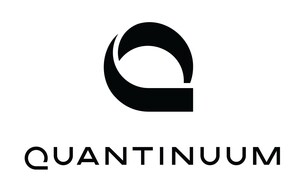
Quantinuum Announces Updates to Quantum Natural Language Processing Toolkit λambeq, Enhancing Accessibility
λambeq update introduces many new important features to provide researchers and developers with more options and flexibility in turning sentences into quantum circuits
OXFORD, England, March 29, 2022 /PRNewswire/ -- The quantum natural language processing team at Quantinuum, the world's leading integrated quantum computing company, has released a major update to its open-source Python library and toolkit, λambeq (pronounced "Lambek").
λambeq converts any natural language sentence into a quantum circuit, ready to be realised on a quantum computer. The new release has been designed for a growing community of researchers, developers and users versed in quantum natural language processing (QNLP) and natural language processing (NLP). Natural language processing markets are projected to grow 27% annually over the next five years.[1]
The update will support the growth of QNLP and potential future applications such as automated dialogue, text mining, language translation, text-to-speech, language generation and bioinformatics.
Quantinuum's Head of Applied Quantum NLP Research, Dr. Dimitrios Kartsaklis, said: "Since we launched λambeq, we have received valuable feedback from a rapidly growing community of users, and many of the new features available today reflect this. The new version of λambeq now comes, for example, with a native state-of-the-art parser that has been fully integrated with the toolkit. Additionally, the toolkit is now equipped with a training package that supports popular supervised learning libraries, such as PyTorch, to help users efficiently train NLP tasks using the quantum circuits and tensor networks that λambeq generates. This update is all about accessibility – and crucially, reducing the time it takes to achieve results."
Additionally, and importantly, λambeq's new neural-based CCG parser, Bobcat, is trained on a large human-annotated corpus of syntactic derivations. It is fully integrated with the toolkit, simplifying the installation process, and presents improved state-of-the-art parsing performance. The previous parser remains part of the toolkit, and for the benefit of the community, Bobcat will also be released as a separate stand-alone open-source tool in due course.
The new update is equipped with a command-line interface, making most of the toolkit's functionality available to users with no programming knowledge. It also contains a new supervised training module designed to simplify the process of training parameterised quantum circuits and tensor networks in a machine learning setup.
λambeq is the first quantum NLP and computational linguistics toolkit. It can convert a sentence into a quantum circuit that inherits its entanglement structure from the sentence's syntactic structure. This construction is motivated by formal mathematical correspondences between mathematical models of grammar and quantum protocols, as established by senior researchers at Quantinuum, Chief Scientist Prof. Bob Coecke and Head of AI Prof. Stephen Clark.
With this update, λambeq becomes more flexible in providing users with more options on the quantum circuits it can generate. It allows manipulation of syntax diagrams and makes it simpler to define the quantum circuits from the syntactic structure.
The visualisation of λambeq's output has also been improved, and documentation has been expanded with numerous examples to remove the barrier to entry for general users.
Where to find λambeq
- λambeq has been released as a conventional Python repository on GitHub and is available here https://github.com/CQCL/lambeq
- More details about the new release can be found here https://cqcl.github.io/lambeq/release_notes.html
- The documentation and tutorials can be found here: https://cqcl.github.io/lambeq/index.html
[1] Mordor Intelligence, 2021: https://www.mordorintelligence.com/industry-reports/natural-language-processing-market
About Quantinuum
Quantinuum is the world's largest integrated quantum computing company, formed by the combination of Honeywell Quantum Solutions' world leading hardware and Cambridge Quantum's class leading middleware and applications.
Quantinuum employs over 400 people including 300 scientists, at eight sites in the US, Europe, and Japan.
Science led and enterprise driven, Quantinuum accelerates quantum computing and the development of applications across chemistry, cybersecurity, finance, and optimization. Quantinuum's focus is to create scalable and commercial quantum solutions to solve the world's most pressing problems, in fields such as energy, logistics, climate change, and health.
Quantinuum's open-source developer toolkit TKET provides platform-inclusive access to the world's leading quantum hardware and simulators and enhances the performance of every Quantinuum product, including cybersecurity key-generation platform Quantum Origin, quantum computational chemistry and materials science package EUMEN, and λambeq, Quantinuum's quantum natural language processing and computational linguistics toolkit.
Quantinuum's H1 generation quantum computer, Powered by Honeywell, is one of the most advanced in the world and was the first to pass the industry standard quantum volume 2048 benchmark. Quantinuum is committed to increasing the quantum volume of its commercial quantum computers by orders of magnitude each year for the next five years.
SOURCE Quantinuum






Share this article